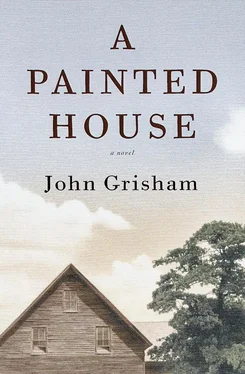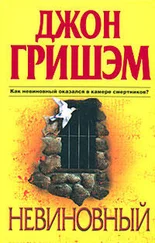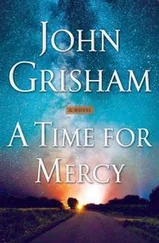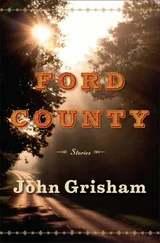“Ricky used to do that,” Gran added from the hallway. “Caught ’im one night out past the silo.”
This helped calm things somewhat. They led me to the kitchen and sat me at the table. My mother scrubbed me while Gran doctored the Johnson grass cuts on my arms. The men saw that matters were under control, so they left to gather eggs and milk.
A loud thunderstorm hit just as we were about to eat, and the sounds were a great relief to me. We wouldn’t be going to the fields for a few hours. I wouldn’t be near Cowboy.
They watched me as I picked at my food. “I’m okay,” I said at one point.
The rain fell heavy and loud onto our tin roof, drowning out conversation so that we ate in silence, the men worrying about the cotton, the women worrying about me.
I had enough worries to crush us all.
“Could I finish later?” I asked, slightly shoving my plate away. “I’m really sleepy.”
My mother decided that I would go back to bed and rest for as long as I needed to. As the women were clearing the table, I whispered to my mother and asked her if she would lie down with me. Of course she would.
She fell asleep before I did. We were in my parents’ bed, in their semidark bedroom, still and cool and listening to the rain, with the men in the kitchen not far away, drinking coffee and waiting, and I felt safe.
I wanted it to rain forever. The Mexicans and the Spruills would leave. Cowboy would be shipped home, back to where he could cut and slash all he wanted, and I’d never know about it. And sometime next summer, when plans were made for the harvest, I’d make sure Miguel and his band of Mexicans were not hauled back to our county.
I wanted my mother next to me, with my father nearby. I wanted to sleep, but when I closed my eyes I saw Hank and Cowboy on the bridge. I was suddenly hopeful that Hank was still there, still in Camp Spruill rummaging for a biscuit, still throwing rocks at the barn at midnight. Then it would all be a dream.
I clung to my mother throughout the day, after the storm passed, after lunch, after the rest of them went to the fields and we stayed around the house. There were whispers between my parents and a frown from my father, but she was adamant. There were times when little boys just needed to be with their mothers. I was afraid to let her out of my sight.
The very thought of telling what I saw on the bridge made me weak. I tried not to think about either the killing or the telling of it, but it was impossible to think of anything else.
We gathered vegetables from the garden. I followed her with the straw basket, my eyes cutting in all directions, ready for Cowboy to leap from nowhere and slaughter both of us. I could smell him, feel him, hear him. I could see his nasty liquid eyes watching every move we made. The weight of his switchblade on my forehead grew heavier.
I thought of nothing but him, and I stayed close to my mother.
“What’s the matter, Luke?” she asked more than once. I was aware that I wasn’t talking, but I couldn’t force words out. There was a faint ringing in my ears. The world was moving slower. I just wanted a place to hide.
“Nothin’,” I said. Even my voice was different — low and scratchy.
“You still tired?”
“Yes ma’am.”
And I’d be tired for a month if it kept me out of the fields and away from Cowboy.
We stopped to examine Trot’s house painting. Since we were there and not picking cotton, Trot was nowhere to be seen. If we left the house, then he would return to his project. The east wall now had a white strip about three feet high, running from the front almost to the rear. It was clean and neat, obviously the work of someone who wasn’t burdened with time.
At his current pace there was no way Trot would finish the house before the Spruills left. What would happen after they left? We couldn’t live in a house with a two-toned east wall.
I had more important things to worry about.
My mother decided she would “put up,” or can, some tomatoes. She and Gran spent hours during the summer and early fall putting up vegetables from our garden — tomatoes, peas, beans, okra, mustard greens, corn. By the first of November the pantry shelves would be packed four-deep with quart jars of food, enough to get us through the winter and early spring. And, of course, they also put up enough for anyone who might need a little help. I was certain that we’d be hauling food to the Latchers in the months to come, now that we were kinfolk.
The very thought made me furious, but again, I wasn’t worried about the Latchers anymore.
My job was to peel tomatoes. Once peeled they would be chopped and placed into large pots and cooked just enough to soften them, then packed into Kerr quart jars, with a tablespoon of salt, and secured with new lids. We used the same jars from year to year, but we always bought new lids. A slight leak around the seal and a jar would spoil, and it was always a bad moment during the winter when Gran or my mother opened a jar and its contents couldn’t be eaten. It didn’t happen often.
Once properly packed and sealed, the jars were placed in a row inside a large pressure cooker half-filled with water. There they would boil for half an hour, under pressure, to remove any remaining air and to further seal the lid. Gran and my mother were very fussy about their canning. It was a source of pride among the women, and I often heard the ladies around the church boast of putting up so many jars of butter beans or of this and that.
The canning began as soon as the garden started producing. I was forced to help with it occasionally and always hated it. Today was different. Today I was quite happy to be in the kitchen with my mother, with Cowboy out in the fields far away.
I stood at the kitchen sink with a sharp paring knife, and when I cut the first tomato I thought of Hank on the bridge. The blood, the switchblade, the painful cry with the first cut, then the silent look of horror as other cuts followed. In that first instant, I think Hank knew he was about to be carved up by someone who’d done it before. He knew he was dead.
My head hit the leg of a kitchen chair. When I awoke on the sofa, my mother was holding ice on a knot above my right ear. She smiled and said, “You fainted, Luke.”
I tried to say something but my mouth was too dry. She gave me a sip of water and told me I wasn’t going anywhere for a while. “Are you tired?” she asked.
I nodded and closed my eyes.
Twice a year the county sent a few loads of gravel to our road. The trucks dumped it, and right behind them a road grader came along and leveled things out. The grader was operated by an old man who lived near Caraway. He had a black patch over one eye, and the left side of his face was scarred and disfigured to the point of making me cringe when I saw it. He’d been injured in the First War, according to Pappy, who claimed to know more about the old man than he was willing to tell. Otis was his name.
Otis had two monkeys that helped him grade the roads around Black Oak. They were little black things with long tails, and they ran along the frame of the grader, sometimes hopping down on the blade itself, just inches above the dirt and gravel. Sometimes they sat on his shoulder, or on the back of his seat, or on the long rod that ran from the steering wheel to the front end. As Otis motored up and down the road, working the levers, changing the angle and pitch of the blade, spitting tobacco juice, the monkeys jumped and swung without fear and seemed to have a delightful time.
If, for some dreadful reason, we kids didn’t make it to the Cardinals, many of us wanted to be road grader operators. It was a big, powerful machine under the control of one man, and all those levers had to be worked with such precision — hands and feet moving with great coordination. Plus, level roads were crucial to the farmers of rural Arkansas. Few jobs were more important, at least in our opinion.
Читать дальше












